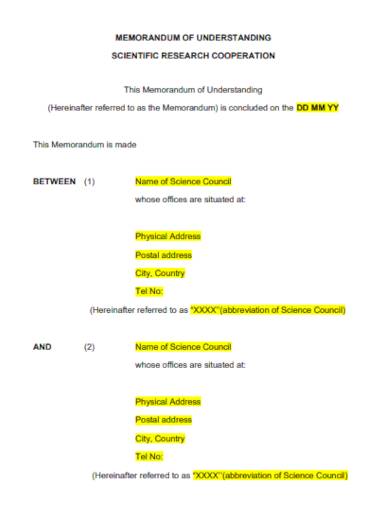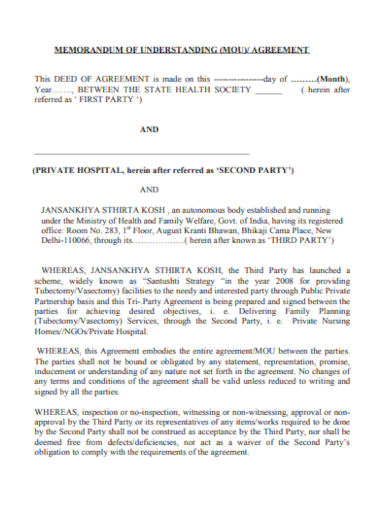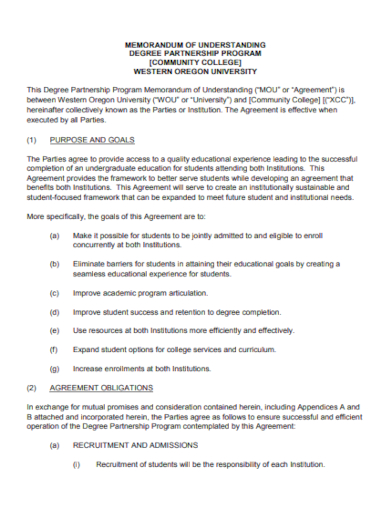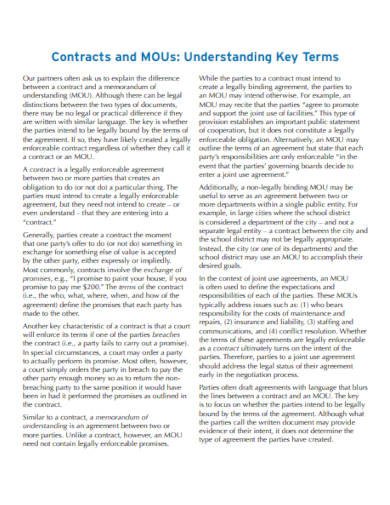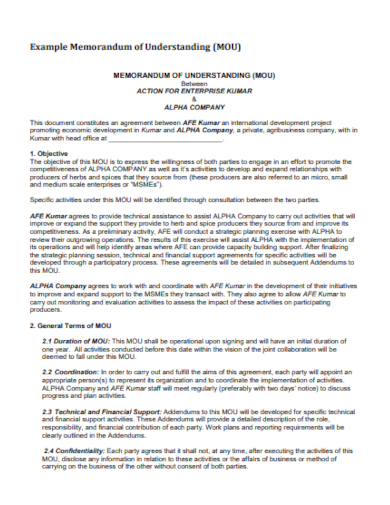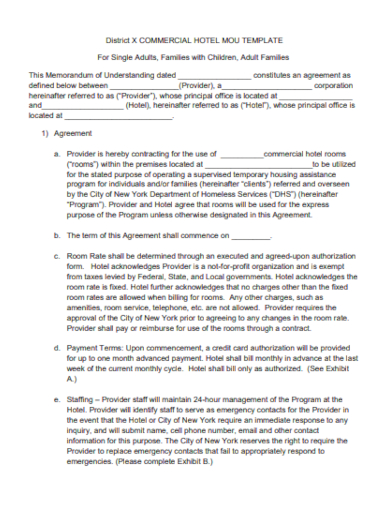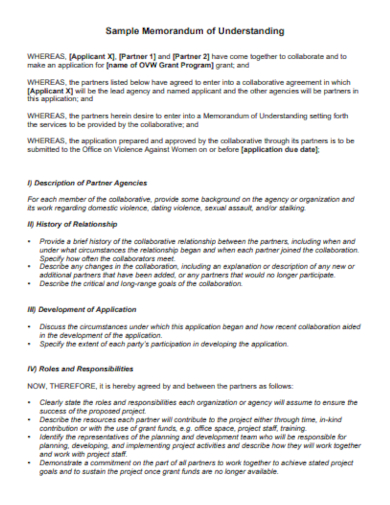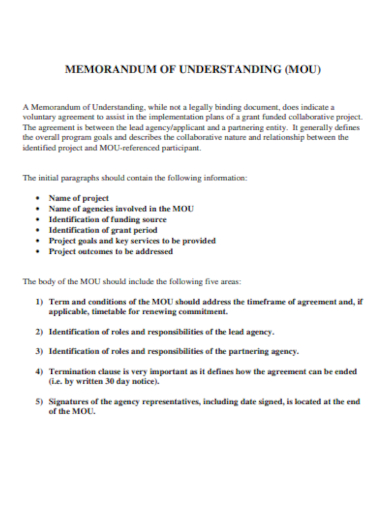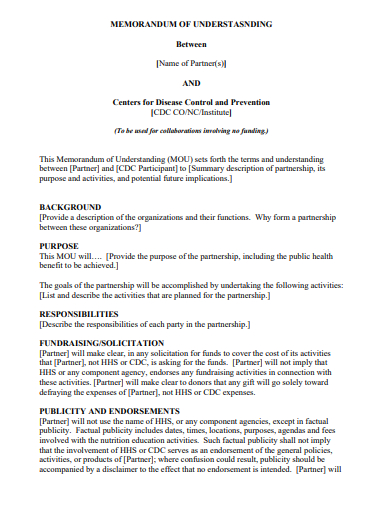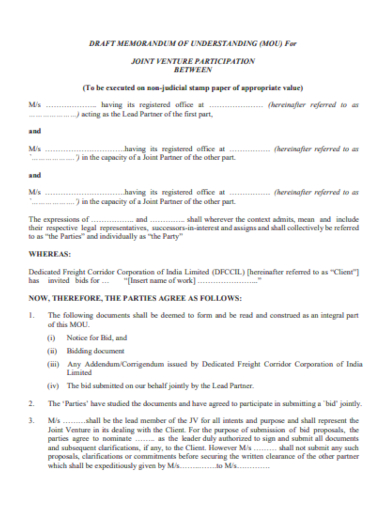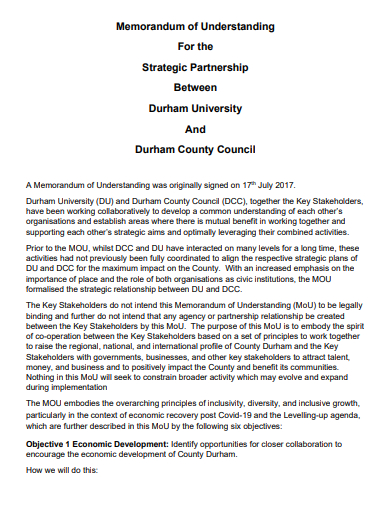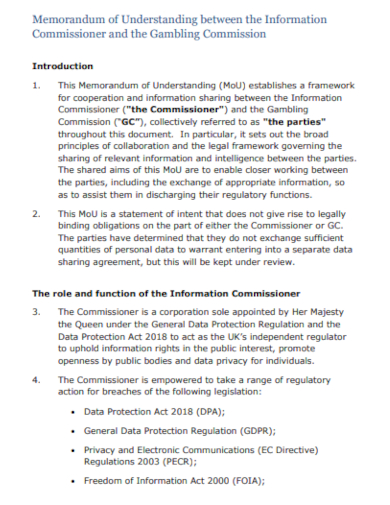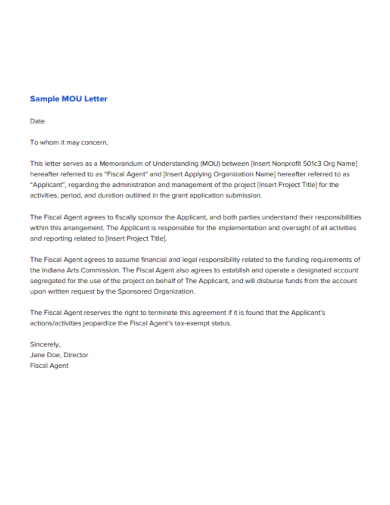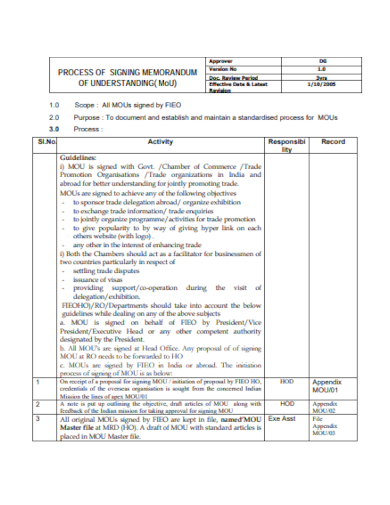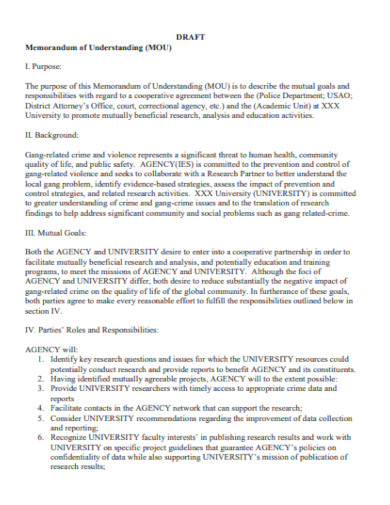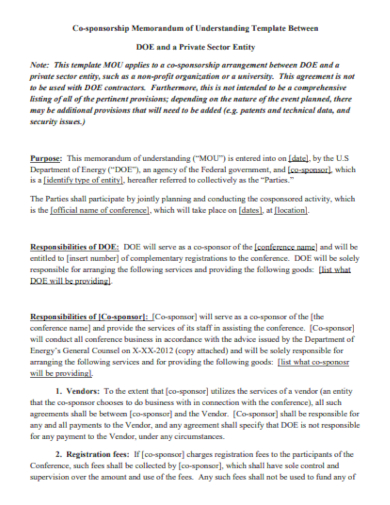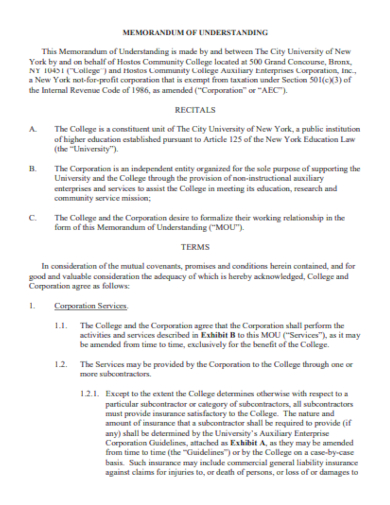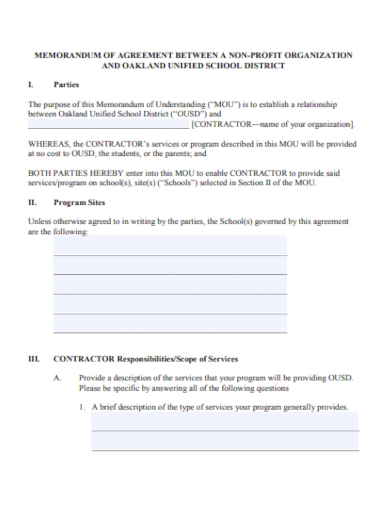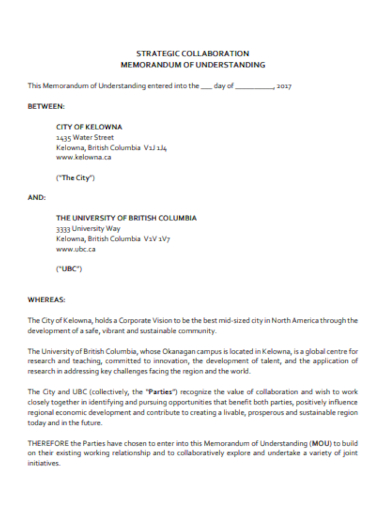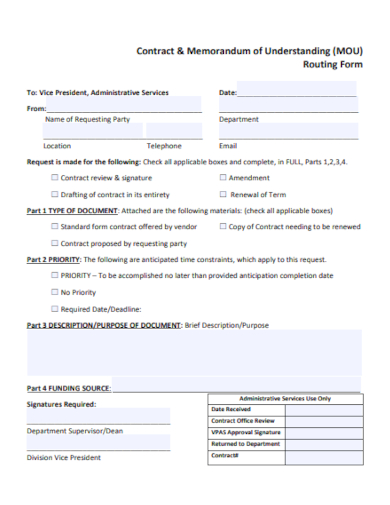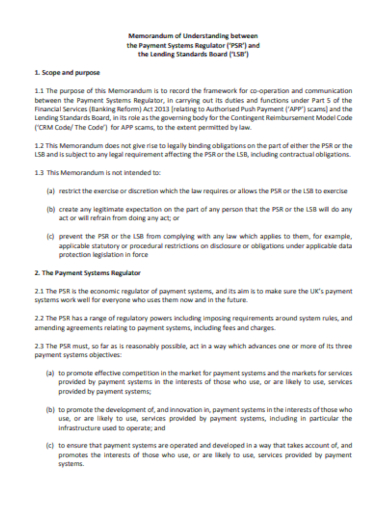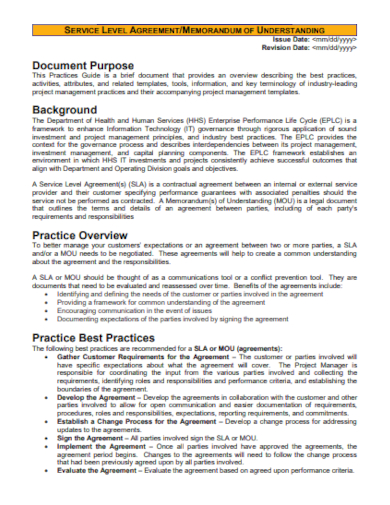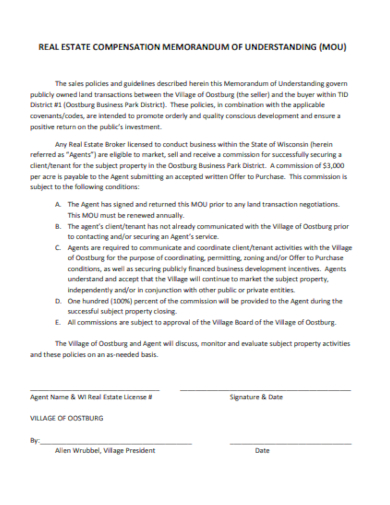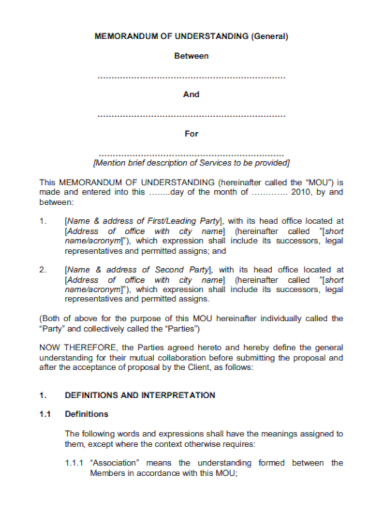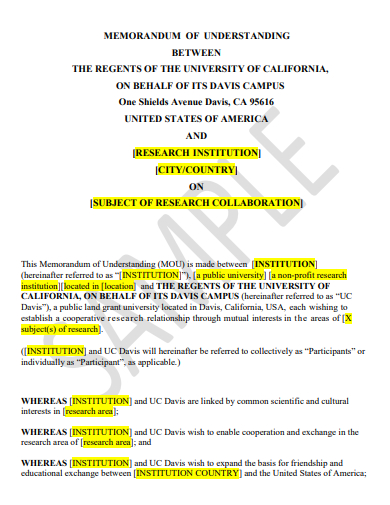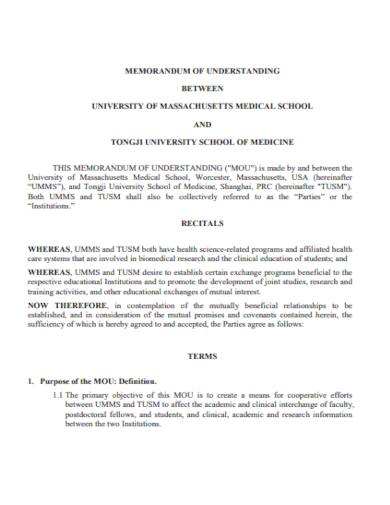Businesses across different industries or sectors utilize different types of legally binding documents to keep and maintain their business relationships with other organizations. Some of these documents include a cooperative agreement, operational agreement, exclusive license agreement, non-exclusive license agreement, and business owner agreement. Another formal agreement but not legally binding that various business organizations use is the memorandum of understanding or MOU. This document is written to establish the terms and conditions between involved parties to achieve their shared business goals.
30+ MOU Samples
1. Memorandum of Understanding Template
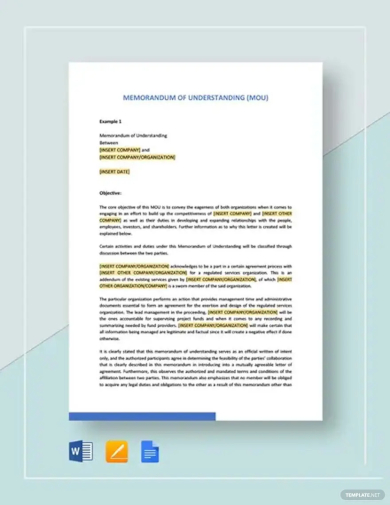
2. Restaurant Memorandum of Understanding Template
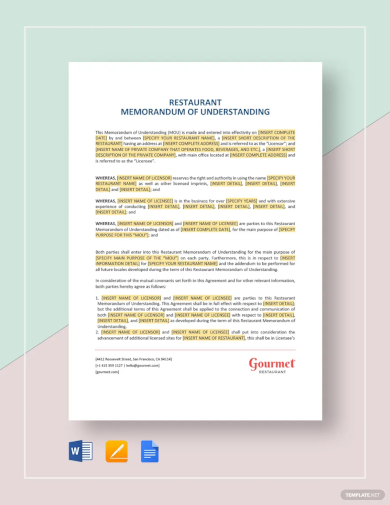
3. Sample Memorandum of Understanding Template
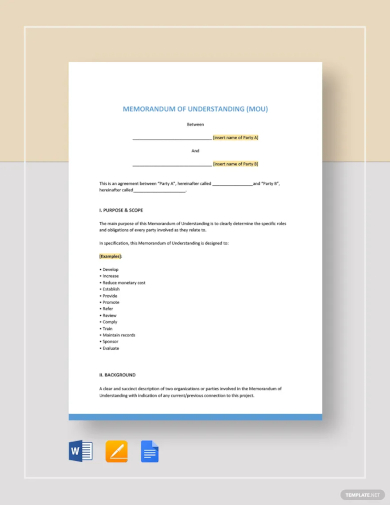
4. Memorandum of Understanding Format for Business
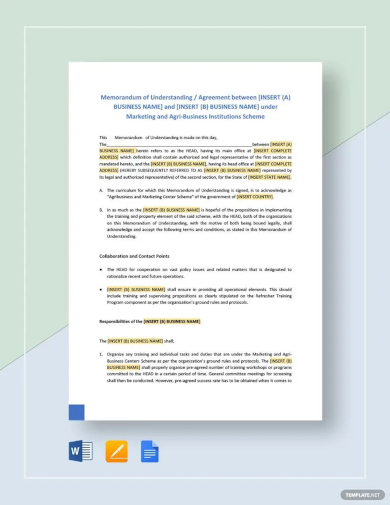
5. Memorandum of Understanding Between Two Individuals
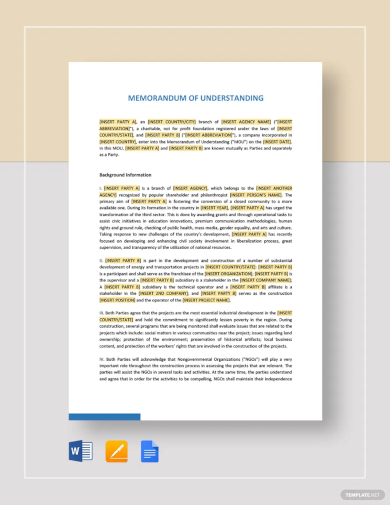
6. MOU Template
7. MOU Agreement Template
8. MOU Partnership Program
9. MOU Contract Understanding
10. MOU Format Template
11. Hotel Business MOU Template
12. MOU Document Template
13. Editable MOU Template
14. Simple MOU Template
15. MOU Joint Venture Participation
16. Strategic Partnership MOU
17. Commission MOU Template
18. Sample MOU Letter Template
19. Process of Signing MOU Template
20. Draft MOU Template
21. Co-Sponsorship Memorandum of Understanding
22. College MOU Template
23. Nonprofit Organization MOU Template
24. Strategic Collaboration MOU Template
25. Contract and Memorandum of Understanding
26. MOU Payment System Template
27. Service Level Agreement MOU
28. Real Estate Compensation MOU
29. Printable MOU Template
30. Research Institution MOU Template
31. Sample University MOU Template
What is MOU?
A memorandum of understanding or MOU is a formal written agreement between two or more business entities to set their business goals and objectives. It is not a contract, therefore, not legally binding, and does not involve the exchange of money between the parties. An MOU is signed by the parties when they have decided and agreed to move forward with a new business proposal or project management plan but have not yet committed to creating a formal contract agreement.
How to Write an MOU?
An MOU is created to show the involved parties’ commitment and understanding of their roles and responsibilities. The document also includes information about their general understanding of possible transactions they want to engage in. Memorandums of understanding are commonly used by government, non-government, and corporate organizations when they want to collaborate with other organizations to keep a record of the terms and conditions, transactions, and negotiations that they have agreed upon.
Step 1: Write the Title and Topic of the Document As Well As the Parties Involved
Choose and write the most relevant and appropriate title for your MOU while ensuring that it reflects the type of document you are creating. Your MOU must also begin with basic information such as the names and addresses of all parties involved in the agreement.
Step 2: Provide the Initiation and Termination Details of the Agreement
The MOU must also contain details about the effective date of the document, when the work will start, and the termination policy that determines the terms in which the agreement can be terminated. If the agreement is for a one-time project, it must mention the starting and ending dates of the entire project.
Step 3: List the Goals, Responsibilities, and the Agreement’s Scope of Work
Write the project description, its duties, milestones, and deadlines that come with it. The project’s scope of work must also be described in the document along with the goals of the project.
Step 4: Determine the Key Stakeholders, Timeline, and Terms and Conditions
Provide a list of the project’s key stakeholders, collaborators, or partnerships. You also have to include an outline of the deliverables’ deadlines as well as the terms and conditions of the MOU. The document must also be signed and dated by all parties.
FAQs
What are the common elements of an MOU?
An MOU commonly includes basic elements such as the points of understanding, terms and conditions, party details, the purpose of the agreement, and the signatures of all parties involved to reflect their mutual agreement.
What are the different kinds of MOUs?
The different variations of MOUs are the Joint Venture MOU, Service Agreement MOU, Outsourcing MOU, Asset Purchase MOU, Share Purchase MOU, and Business Relationship MOU.
What are the advantages of writing an MOU?
With an MOU, parties can establish clear business objectives, reduce uncertainty and miscommunication between them, provide a foundation for the future, ease of exit, and creates concise and clear documentation of the terms that were included in their negotiations.
A memorandum of understanding is a written formal agreement between two or more parties to display their common will and provides information on their intention of a mutual line of action. This document indicates that these parties have agreed and reached an understanding to move forward with a shared business goal and objective. An MOU is not legally binding but they are commonly used and always taken seriously during negotiations and business transactions.
Related Posts
FREE 23+ Dealership Agreement Templates in PDF MS Word ...
FREE 11+ Supply Agreement Contract Samples in MS Word PDF
FREE 10+ Attendance Management Policy Samples in PDF MS Word
FREE 8 Board Memo Templates in PDF
FREE 8+ Board Memo Templates in MS Word PDF
FREE 10+ Security Guard Contract Samples in PDF MS Word
FREE 8+ Contract Food Service Samples in MS Word PDF ...
FREE 15+ Sample Real Estate Partnership Agreement Templates in ...
FREE 9+ School Franchise Agreement Samples in MS Word ...
FREE 11+ Interior Design Contract Samples in PDF MS Word ...
FREE 10+ Food Supplier Contract Samples in PDF
FREE 31+ Agreement Format Samples in MS Word PDF
FREE 10+ Film Investment Contract Samples in MS Word Google ...
FREE 7+ Sample Physician Employment Agreement Templates in ...
FREE 8+ Film Production Contract Samples in MS Word Pages ...

